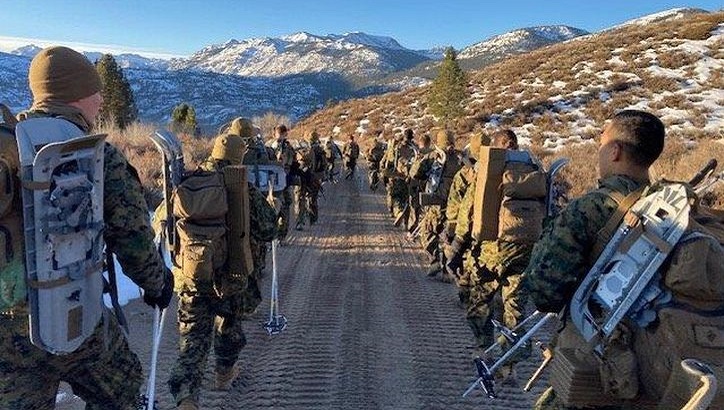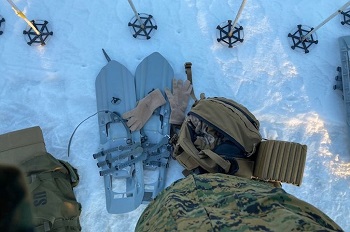Navy Lt. stresses importance of being proactive during winter training
 Marines march during a cold weather leadership course at Marine Corps Mountain Warfare Training Center outside of Bridgeport, California. (U.S. Navy photo by Lt. Victoria Selkirk)
Marines march during a cold weather leadership course at Marine Corps Mountain Warfare Training Center outside of Bridgeport, California. (U.S. Navy photo by Lt. Victoria Selkirk)
The most important lesson for Navy Lt. Victoria Selkirk during a recent two-week leadership course at Marine Corps Mountain Warfare Training Center (MCMWTC) was that learning about cold-weather training in a lab or clinic is very different from experiencing cold-weather training.
“When I consider the basic nutritional aspects of someone who is working or training in cold weather, generally what I’m thinking of is two components: hydration and energy intake,” said Selkirk, a registered dietician and combined food service department head at Navy Medicine and Training Command Twentynine Palms at Marine Corps Air Ground Combat Center Twentynine Palms in California. “Both of those are really important to ensure your safety and your well-being, and also in making sure you have enough energy to perform in whatever capacity is needed.”
Selkirk added that while at the MCMWTC it was impressed on her how quickly an individual can become dehydrated without realizing it because of factors like thirst mechanisms not being triggered in colder temperatures. Selkirk said it is extremely important to remember to make sure you are drinking preferably warm, non-caffeinated fluid when performing prolonged, arduous activities outdoors in cold weather.
Located 21 miles northwest of Bridgeport, California in the Sierra Nevada Mountains, MCMWTC provides the Marine Corps the ideal location to conduct mountain warfare operations.
For the lieutenant and those who have cycled through MCMWTC, ‘energy intake’, including the consumption of high-calorie snacks, becomes highly important while operating in cold weather and higher altitude environments.
“The colder climate dramatically increases the rate at which your body burns calories and, of course, you need to replace those,” Selkirk said. “The heat your body generates comes from the foods that you eat, so carbohydrates and fat can help with that.”
Despite having a solid background and understanding of how the human body reacts to various stressors, she said her experience, which included braving temperatures anywhere from 9 to 35 degrees Fahrenheit, while navigating snow-covered mountainous terrain and carrying roughly 70 pounds of gear, provided some surprises.
 Gear, including snowshoes, gloves, and trekking poles, used by sailors and Marines during the cold weather leadership course at Marine Corps Mountain Warfare Training Center. (U.S. Navy photo by Lt. Victoria Selkirk)
Gear, including snowshoes, gloves, and trekking poles, used by sailors and Marines during the cold weather leadership course at Marine Corps Mountain Warfare Training Center. (U.S. Navy photo by Lt. Victoria Selkirk)
“As someone who is board-certified in sports dietetics, there was a learning curve for me in understanding how much fuel my body needed,” Selkirk said. “I discovered that I consumed much more energy than I could have figured out had I sat down and tried to calculate it in a clinic prior to that experience in the field.”
While at the training center, Selkirk said that she was introduced to the concept of “continuous chow,” meaning eating small, healthy snacks constantly to maintain a consistent level of energy while working or training.
She suggested roasted almonds, dried cranberries, raisins, dried vegetables, crackers, and energy bars, all of which were included in her group’s MREs (meals ready-to-eat). She said many of them would have a snack every 30 to 45 minutes.
Selkirk reiterated the importance of taking preventative measures without the normal warning signs that your body is being depleted.
“If you’re not paying attention to it, you’re going to overlook it and you won’t even recognize it,” Selkirk said. “Whereas if you were in a hot climate, your body prompts you to eat and drink adequate amounts.”
Selkirk described the difference between what she has studied and what she experienced as a “definite paradigm shift.”
“When you’re actually out there training like that, you notice that you may have to adjust accordingly and not just rely on the calculations that you’d previously anticipated,” she said.
“Always go prepared, always bring snacks, always bring more water than you think you might need,” Selkirk said. “Sometimes there are variables thrown into the equation that are going to force you to modify accordingly on the spot.”
Specific elements that cold weather training and exercising may impact, and that people should look out for, include psychological and physical signs including dehydration, frostbite, dry skin, exhaustion, and fatigue.
“From a psychological standpoint, it’s important to maintain connectivity with the people that you are training or working with outdoors,” Selkirk said. “Don’t isolate yourself. Don’t ‘go internal.’ Psychological factors can lead to physical issues. People may not be paying as much attention to signals from their body, including eating and drinking as much as they should or the wearing down of their momentum.”
She said it is important to be aware of the development of apathy or fatigue and that the mind-body connection is paramount in those types of training environments.
Selkirk said there are some benefits to training in cold weather on a regular basis, including the development of brown fat, or brown adipose tissue, which is activated by colder temperatures and burns calories and other fat to produce heat, also known as thermogenesis.
Some of the most important points to remember, she said, include:
- Consuming more water than you would during warm weather exercise/training
- Consuming more calories/carbohydrates than you would during warm weather exercise/training
- Avoiding caffeine and alcohol during and leading up to cold-weather exercise or training
- Trying to consume warm food or drink hot beverages whenever possible
Although physically and mentally tough at times, Selkirk said it was an eye-opening experience.
“For me, as a clinician, it was very educational and illuminating as to what our Marines are dealing with out there in the field,” she said.